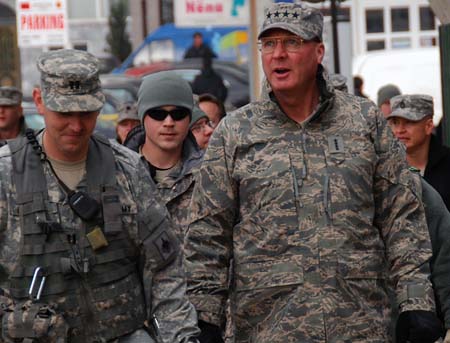The  United States must avoid the temptation of making severe cuts to the National Guard due to the tough fiscal climate and scheduled completion of large-scale military operations in Afghanistan in several years, after Iraq, the nation’s top citizen soldier told lawmakers last week. “After every major war in the 20th century, the Guard and Reserve [were] put back on the shelf. My intuition tells me that we’re going to have to argue very strenuously in front of our services to make the case [against that],” said Gen. Craig McKinley, National Guard Bureau chief, in testimony before the House Armed Services Committee’s military personnel panel. “We believe we are the answer to America’s security needs in a time of fiscal constraint. And we’re willing to put our forces on the line—operationally, their capability, their equipment, and their leadership—to make that case in front of the American people.” Forthcoming budget cuts and decisions “must not disproportionally affect” the Guard, or the Reserve component, for that matter, since such moves could hinder “the nation’s ability to respond to future contingencies at home and abroad,” asserted McKinley during the July 27 hearing. (McKinley’s written statement)
United States must avoid the temptation of making severe cuts to the National Guard due to the tough fiscal climate and scheduled completion of large-scale military operations in Afghanistan in several years, after Iraq, the nation’s top citizen soldier told lawmakers last week. “After every major war in the 20th century, the Guard and Reserve [were] put back on the shelf. My intuition tells me that we’re going to have to argue very strenuously in front of our services to make the case [against that],” said Gen. Craig McKinley, National Guard Bureau chief, in testimony before the House Armed Services Committee’s military personnel panel. “We believe we are the answer to America’s security needs in a time of fiscal constraint. And we’re willing to put our forces on the line—operationally, their capability, their equipment, and their leadership—to make that case in front of the American people.” Forthcoming budget cuts and decisions “must not disproportionally affect” the Guard, or the Reserve component, for that matter, since such moves could hinder “the nation’s ability to respond to future contingencies at home and abroad,” asserted McKinley during the July 27 hearing. (McKinley’s written statement)
As with previous stealth aircraft unveilings, the Air Force’s imagery of the F-47 Next-Generation Air Dominance fighter has been doctored to keep adversaries guessing about its true shaping and design philosophy.